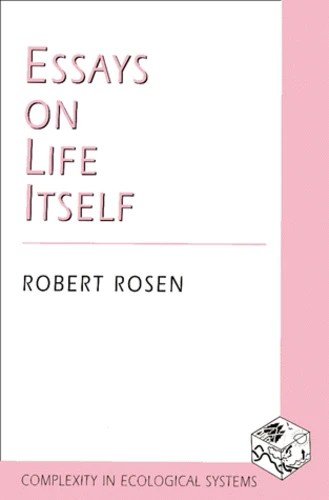ESSAYS ON LIFE ITSELF
Par :Formats :
Définitivement indisponible
Cet article ne peut plus être commandé sur notre site (ouvrage épuisé ou plus commercialisé). Il se peut néanmoins que l'éditeur imprime une nouvelle édition de cet ouvrage à l'avenir. Nous vous invitons donc à revenir périodiquement sur notre site.
- Paiement en ligne :
- Livraison à domicile ou en point Mondial Relay indisponible
- Retrait Click and Collect en magasin gratuit
- Réservation en ligne avec paiement en magasin :
- Indisponible pour réserver et payer en magasin
- Nombre de pages361
- PrésentationBroché
- Poids0.505 kg
- Dimensions15,3 cm × 22,9 cm × 2,0 cm
- ISBN0-231-10511-8
- EAN9780231105118
- Date de parution02/02/2000
- Collectioncomplexity in ecological syste
- ÉditeurColumbia University Press
Résumé
Compiling twenty articles on the nature of life and on the objective of the natural sciences, this remarkable book complements Robert Rosen's groundbreaking Life Itself - a work that influenced a wide range of philosophers, biologists, linguists, and social scientists. Breaking free from the constraints of reductionist reasoning, which maintains that simple, empirical mechanisms are the basis of al] life, the renowned biophysicist tackles a remarkable range of subjects that will stimulate similarly far-reaching audiences.
In Essays on Life Itself Rosen takes to task the central objective of the natural sciences, calling into question the attempt to create objectivity in a subjective world. The book opens with an exploration of the interaction between biology and physics, unpacking Schrödinger's famous text What is Life, and revealing the shortcomings of the notion that artificial "intelligence" can truly replicate life. Rosen also challenges the paradox of the brain as organism and the receptacle of scientific reasoning. Elegantly rounding out his argument, the author reflects on the quandary of side effects, moments when science confronts unpredicted outgrowths of a process thought to be reduced to a system.
An intriguing enigma links all of the essays: How can science explain the unpredictable? As a century defined by extraordinary scientific progress draws to a close, Essays on Life Itself is a critical work that asks readers to reconsider what we have learned and where science can lead us in the years to come.
Compiling twenty articles on the nature of life and on the objective of the natural sciences, this remarkable book complements Robert Rosen's groundbreaking Life Itself - a work that influenced a wide range of philosophers, biologists, linguists, and social scientists. Breaking free from the constraints of reductionist reasoning, which maintains that simple, empirical mechanisms are the basis of al] life, the renowned biophysicist tackles a remarkable range of subjects that will stimulate similarly far-reaching audiences.
In Essays on Life Itself Rosen takes to task the central objective of the natural sciences, calling into question the attempt to create objectivity in a subjective world. The book opens with an exploration of the interaction between biology and physics, unpacking Schrödinger's famous text What is Life, and revealing the shortcomings of the notion that artificial "intelligence" can truly replicate life. Rosen also challenges the paradox of the brain as organism and the receptacle of scientific reasoning. Elegantly rounding out his argument, the author reflects on the quandary of side effects, moments when science confronts unpredicted outgrowths of a process thought to be reduced to a system.
An intriguing enigma links all of the essays: How can science explain the unpredictable? As a century defined by extraordinary scientific progress draws to a close, Essays on Life Itself is a critical work that asks readers to reconsider what we have learned and where science can lead us in the years to come.


